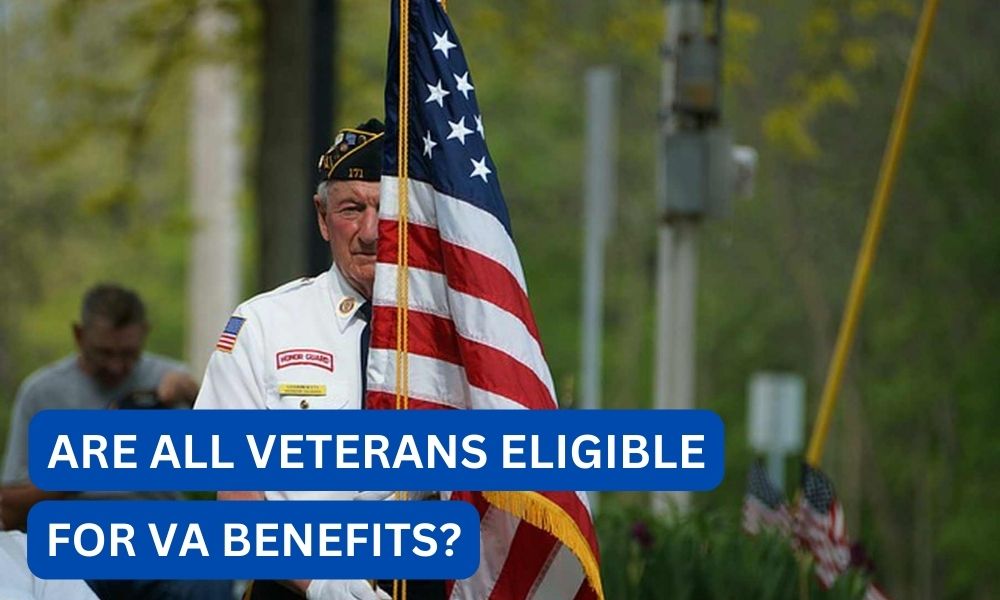When it comes to serving their country, veterans have made immense sacrifices and have put their lives on the line to protect their nation. As a token of gratitude, the United States government offers various benefits to veterans through the Department of Veterans Affairs (VA). These benefits include healthcare, education, home loans, and disability compensation, among others. However, there is often confusion and misinformation surrounding who is eligible for these benefits. In this article, we will explore the question, “Are all veterans eligible for VA benefits?” and provide a comprehensive answer backed by research and statistics.
Contents
Who is Considered a Veteran?
Before delving into the eligibility criteria for VA benefits, it is essential to understand who is considered a veteran. According to the VA, a veteran is “a person who served in the active military, naval, or air service and who was discharged or released under conditions other than dishonorable.” This definition includes individuals who served in the Army, Navy, Air Force, Marine Corps, and Coast Guard.
It is worth noting that not all individuals who served in the military are considered veterans. For example, those who were dishonorably discharged are not eligible for VA benefits. Additionally, individuals who served in the National Guard or Reserves may be considered veterans if they were called to active duty by the federal government, but not if they were only on state duty.
Read:What stores can i use my aetna healthy benefits cardEligibility for VA Benefits
The eligibility criteria for VA benefits vary depending on the type of benefit. In general, there are three main categories of eligibility: service-connected, non-service-connected, and special eligibility.
Service-Connected Eligibility
Service-connected eligibility refers to benefits that are available to veterans who have a disability or illness that is directly related to their military service. This includes physical injuries, mental health conditions, and diseases that were caused or aggravated by their time in the military.
To be eligible for service-connected benefits, a veteran must have a discharge other than dishonorable and must have a disability rating of at least 10%. The disability rating is determined by the VA based on the severity of the disability and how it affects the veteran’s daily life. The higher the rating, the more benefits the veteran is entitled to receive.
It is worth noting that not all disabilities are eligible for service-connected benefits. The VA has a list of conditions that are considered presumptive, meaning they are presumed to be caused by military service. These include conditions such as post-traumatic stress disorder (PTSD), certain types of cancer, and chronic diseases. Veterans with these conditions do not have to prove a direct link between their disability and their military service to be eligible for benefits.
Read:How to restart suspended social security benefits?Non-Service-Connected Eligibility
Non-service-connected eligibility refers to benefits that are available to veterans who have a disability or illness that is not related to their military service. These benefits are typically available to all veterans, regardless of their discharge status, as long as they meet certain criteria.
One example of non-service-connected benefits is the VA pension, which provides financial assistance to low-income veterans who are permanently and totally disabled, or over the age of 65. Another example is the VA healthcare system, which is available to all veterans who meet certain income and service requirements.
Special Eligibility
Special eligibility refers to benefits that are available to specific groups of veterans, such as former prisoners of war, Purple Heart recipients, and Medal of Honor recipients. These benefits may include additional healthcare services, financial assistance, and other forms of support.
Factors That May Affect Eligibility
While the eligibility criteria for VA benefits are clear, there are certain factors that may affect a veteran’s eligibility. These include the length of service, the type of discharge, and the veteran’s income.
Length of Service
The length of service is an essential factor in determining eligibility for VA benefits. In general, veterans must have served for at least 24 months to be eligible for most benefits. However, there are exceptions to this rule. For example, veterans who were discharged due to a service-connected disability may be eligible for benefits regardless of their length of service.
Read:What time do snap benefits get deposited in texas 2024?Type of Discharge
As mentioned earlier, veterans with a dishonorable discharge are not eligible for VA benefits. However, there are other types of discharges that may affect eligibility. For example, veterans with a general discharge under honorable conditions may be eligible for some benefits, but not all. It is essential for veterans to understand their discharge status and how it may affect their eligibility for benefits.
Income
For certain benefits, such as the VA pension, income is a crucial factor in determining eligibility. Veterans must meet certain income requirements to be eligible for this benefit. However, for other benefits, such as VA healthcare, income is not a factor. This means that even if a veteran has a high income, they may still be eligible for healthcare services through the VA.
Examples of Eligibility for VA Benefits
To further illustrate the eligibility criteria for VA benefits, let’s look at a few examples of veterans who may be eligible for different types of benefits.
Example 1: John
John served in the Army for four years and was honorably discharged. During his time in the military, he sustained a knee injury that has caused him chronic pain and limited mobility. After leaving the military, John was diagnosed with PTSD. He applies for VA benefits and is found to be eligible for service-connected benefits due to his knee injury and presumptive benefits for his PTSD. He receives a disability rating of 50% and is entitled to receive monthly compensation for his disabilities.
Example 2: Sarah
Sarah served in the Air Force for two years and was discharged with a general discharge under honorable conditions. She has no service-connected disabilities, but she is over the age of 65 and has a low income. Sarah applies for the VA pension and is found to be eligible based on her age and income. She receives a monthly pension from the VA to help with her living expenses.
Example 3: Mark
Mark served in the Marine Corps for 10 years and was honorably discharged. He has no service-connected disabilities, but he has a high income. Mark applies for VA healthcare and is found to be eligible based on his length of service. He receives healthcare services through the VA at no cost.
Statistics on VA Benefits Eligibility
To better understand the eligibility for VA benefits, let’s look at some statistics on the number of veterans who are receiving benefits.
- As of September 2020, there were over 18 million veterans in the United States.
- Out of these 18 million veterans, over 9 million were enrolled in the VA healthcare system.
- In 2019, the VA provided over $100 billion in disability compensation and pension benefits to veterans and their families.
- Over 4 million veterans received disability compensation in 2019.
- As of 2020, there were over 5 million veterans receiving VA education benefits.
These statistics show that a significant number of veterans are eligible for and receiving VA benefits. However, there are still many veterans who may be eligible for benefits but are not receiving them due to lack of awareness or understanding of the eligibility criteria.
Conclusion:
In conclusion, not all veterans are eligible for VA benefits. Eligibility depends on various factors, including the type of discharge, length of service, and income. Veterans who have a service-connected disability or illness are generally eligible for benefits, while those with non-service-connected disabilities may be eligible for certain benefits based on their income and other criteria. It is essential for veterans to understand their eligibility for benefits and to apply for them if they believe they are eligible. The VA is committed to providing support and assistance to those who have served their country, and it is crucial for veterans to take advantage of the benefits they have earned through their service.









